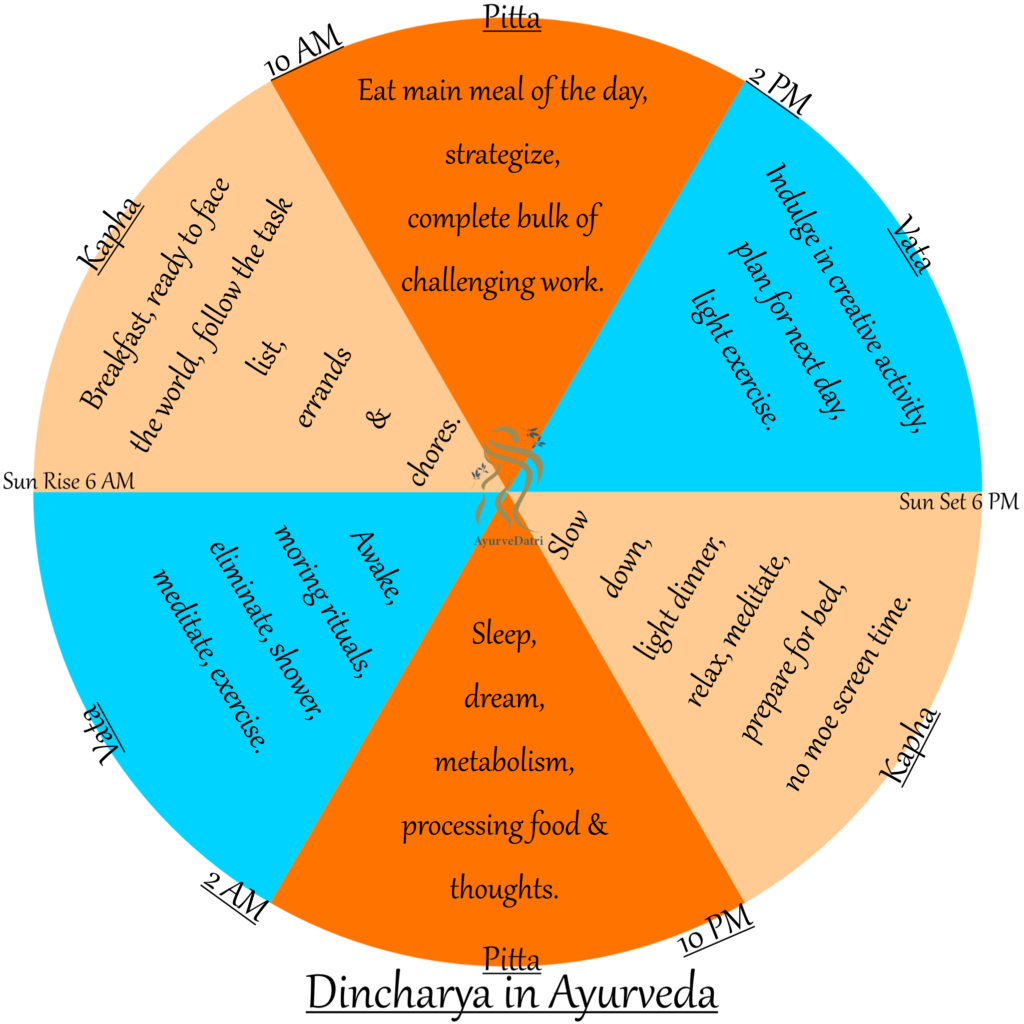
Ayurvedic lifestyle is a precise combination of science and art of living a healthy and peaceful life. Ayurveda advocates living consciously. Living a life of balance within, which is at the same time in balance and harmony with the environment.
You may think how is this possible?
Ayurveda has made it simple to practice by “Dinacharya”.
Dincharya is a Sanskrit term that means “daily routine.” Dincharya helps create optimal wellness through routine, detoxification and nourishment. It helps you live a life of balance and harmony.
An Ayurvedic daily routine emphasizes on having a regularity and schedule in everyday living. A simple blueprint of an ayurvedic daily Routine is as follows-
Rise and shine early. With the birds and before the sun.
Benefit – According to Ayurveda getting up early helps in healthy elimination and thus supports digestive health. Increases productivity, brings more satisfaction and confidence.
Brushing and flossing the teeth. Ayurvedic texts describe sticks from medicinal trees like Neem, Karanja, mango and liquorice to be used for brushing of the teeth.
Benefits – Supports oral hygiene and digestive health. Chewing on the stems is believed to cause attrition and levelling of biting surfaces, facilitate salivary secretion and, possibly, help in plaque control, while some stems have an anti-bacterial action.
Gently scraping the tongue with the help of a tongue scraper.
Benefits – Removes ama (toxins), freshens breath, sparks digestion (agni) and enhances the sense of taste.
Oil is swished for about 10 – 20 minutes to strengthen the gums and teeth.
Benefits – Eradicates harmful bacteria, pull toxins from the body, strengthens the voice, helps remove tension in the jaw and neck.
Drink a glass of room temperature or warm water, preferably with lemon and honey.
Benefits – Initiates digestion (supports agni) and elimination. Help remove toxins (Ama) from the body.
If not already a part of your routine, begin sitting on the toilet to encourage elimination. Drinking a glass of warm/ hot water helps.
Nasya oil can be used on its own or in conjunction with a neti pot to clear & moisturize the nasal passageways.
Benefits – Balances all Doshas, beneficial for nasal, throat and problems of neck and jaw, it also helps relieve stress.
Daily oil application of oil through a loving self massage.In Sanskrit, the word “sneha” can be translated as both “oil” and “love.” Both oil and love provide a sense of nurturing, grounding, and nourishment.
Benefits – Decreases the effects of aging, nourishes the body, benefits sleep patterns, benefits skin, imparts tone and vigor to the dhatus (tissues) of the body, stimulates the internal organs of the body, increasing circulation and pacifies vata and pitta.
The practice of placing warm oil in the ear is called Karn- pooran in Ayurveda.
Benefits – Reduces dryness, itching and prevents tinnitus and ringing in the ear according to Ayurveda.
Practice yoga postures for a healthy body & mind.
Calm the mind with 5 – 20 minutes each day.
Benefits – A daily practice of meditation calms the mind, reduces stress, helps focus, improves patience, tolerance and creativity.
Incorporate your Skincare Ritual. Ayurveda recommends a morning shower every day.
Benefits – According to Ayurveda it helps ignite digestive fire along with help cleanse and feel fresh.
According to Ayurvedic eating habits, eat breakfast only when hungry.
Benefits – Proper energy and nutrients for a successful day.
Lunch – Eating lunch around noon time everyday. Sit down to eat and eat mindfully. Include all six tastes in your meal.
Benefits – Noon is Pitta time and supports digestion.
Slowing down from evening. Do not engage in vigorous exercises or stimulating activities in the evening.
Benefit – Helps balance Vata. Calms the mind and help reduce stress, improves the quality of sleep.
Going to bed around the same time everyday between 9 pm- and 10 pm.
Although these practices may seem simple to initiate, making changes to habitual patterning is often the most challenging part. Taking a small step at a time, that feels most supportive, to the needs and building from there is a best way to start. Once the new routine becomes a habit adding on from there helps. Practiced regularly, Dinacharya helps create balance and harmony, and a smooth transition during this critical period in women’s life.
By understanding the bodily changes well in advance and making gradual modifications, one step at a time helps bring good health as well as improves the quality of life.
A daily routine suited to your own unique mind- body type helps balance Vata, mitigates the effect of aging and improves the quality of life.
References
The information provided on this website is for educational purposes only and is not intended to serve as medical advice. All information and services provided by AyurveDatri are for educational purposes and are not a substitute for medical care by a licensed health care professional. None of the information is intended to diagnose, treat, or cure any disease.
